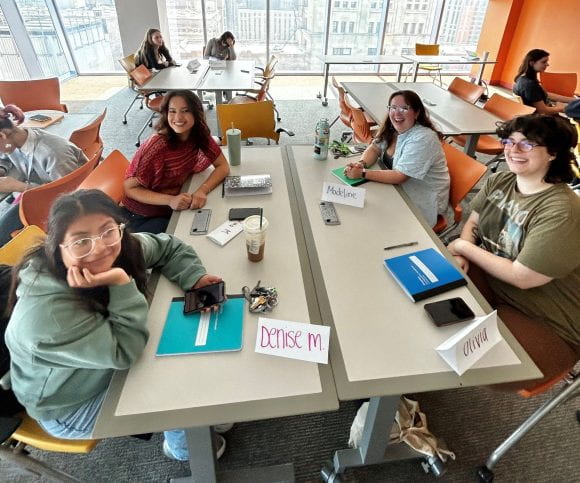By: Salma Mardi
At Roosevelt University’s Honors Program, the journey of knowledge transcends ordinary boundaries through the Honors Exchange. This exceptional co-curricular initiative offers honors members a comprehensive array of experiences, blending intellectual inquiry, practical learning, community involvement, and social connection. It’s a holistic educational approach that spans disciplines, genres, and geographical borders, facilitating deep connections with faculty, partners, and the local community.
This academic year, the overarching theme of the Honors Exchange is “Keeping Track.” This theme prompts us to delve into critical narratives that urge reflection on history, memory, and the need to preserve and learn from past experiences. The entire Honors Exchange for this year is aptly named “On (not) forgetting: How we keep track of the Holocaust,” capturing the essence of the theme and its profound implications.
We began this year’s Honors Exchange with a panel exploring the Jewish Diaspora around the world. During the discussion, each panelist shared their unique experiences and personal connections to the Jewish Diaspora, offering profound insights into the topic. Director of the Honors Program, Sarah Maria Rutter, added to the discourse by introducing the concept of sacred reading—engaging with text with rigor and trust. She encouraged students to collect “sparklets” during the panel discussion, capturing beautiful and impactful moments shared by the speakers. As the panel concluded, students eagerly shared their collected “sparklets,” fostering a sense of shared understanding and appreciation for the valuable insights gained.

Our heartfelt appreciation goes out to our esteemed panelists: Professor Lynn Weiner, Professor Susan Weininger, Professor and Executive Director of the Honors Program Marjorie Jolles, Professor Rifat Gorener, and Ken Granle, Director for International Students & Global Scholar Services. Their valuable insights and perspectives enriched the discussion, setting the tone for a thought-provoking academic journey ahead.
Their contributions have ignited a deeper interest in our theme, reminding us of the significance of historical memory and the need to preserve it. We look forward to building upon this enlightening discussion as we continue our exploration of “Keeping Track” throughout the academic year. Thank you to our panelists for their valuable time and dedication to our academic community.
Looking ahead, anticipation is high for the upcoming field trip to the Illinois Holocaust Museum and Education Center in Skokie, IL. This visit promises to be an educational and emotional journey, deepening our understanding of history and reinforcing the importance of “keeping track” of significant events for future generations. The field trip to the Illinois Holocaust Museum and Education Center is not merely a visit; it’s an immersive experience that brings history to life. By witnessing firsthand the exhibits and stories, students will gain a deeper understanding of the Holocaust’s impact, emphasizing the critical need to remember and learn from history. This journey will not only enrich their academic knowledge but also cultivate empathy, tolerance, and a commitment to prevent such atrocities in the future.
